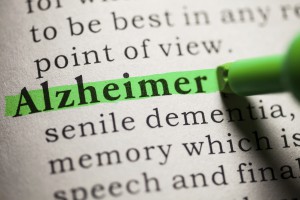Many people confuse memory loss and “forgetfulness” with Alzheimer’s. A lot of people have trouble with memory — this does NOT mean they have Alzheimer’s. Alzheimer’s is the most common form of dementia, a general term for memory loss. Alzheimer’s is the sixth leading cause of death in the United States and those with Alzheimer’s live an average of eight years after their symptoms become noticeable, but can live longer depending on age and other health conditions.
The majority of people with Alzheimer’s are 65 and older. The most common early symptom of Alzheimer’s is difficulty remembering newly learned information as Alzheimer’s typically affects that part of the brain first.
Scientists aren’t sure what causes Alzheimer’s, but believe plaques and tangles, greater than the normal amount that occur due to aging, form in the brain, blocking nerve cell communication and causing cell death. As the disease advances, the severity of symptoms increase. These include serious memory loss, mood and behavior changes, disorientation, confusion about events, time and place; unfounded suspicions about family, friends and caregivers. People with late stage Alzheimer’s often have difficulty speaking, swallowing and walking.
If you or a loved one is experiencing symptoms of dementia, make an appointment with a physician. Only a doctor can diagnose Alzheimer’s. There is currently no cure, but treatments for symptoms are available that can temporarily slow the worsening of dementia symptoms and improve quality of life.
If you or a loved one has been diagnosed with Alzheimer’s or a related dementia, you are not alone. The Alzheimer’s Association is the trusted resource for reliable information, education, referral and support to millions of people affected by the disease. Call their 24/7 Helpline: 800.272.3900
All content of this newsletter is intended for general information purposes only and is not intended or implied to be a substitute for professional medical advice, diagnosis or treatment. Please consult a medical professional before adopting any of the suggestions on this page. You must never disregard professional medical advice or delay seeking medical treatment based upon any content of this newsletter. PROMPTLY CONSULT YOUR PHYSICIAN OR CALL 911 IF YOU BELIEVE YOU HAVE A MEDICAL EMERGENCY.

